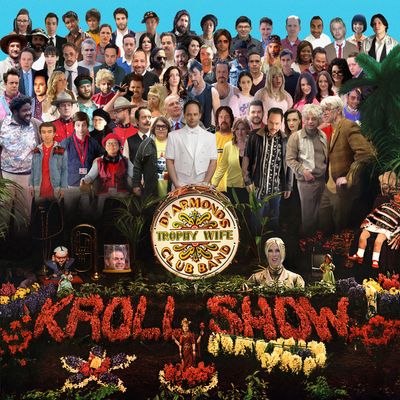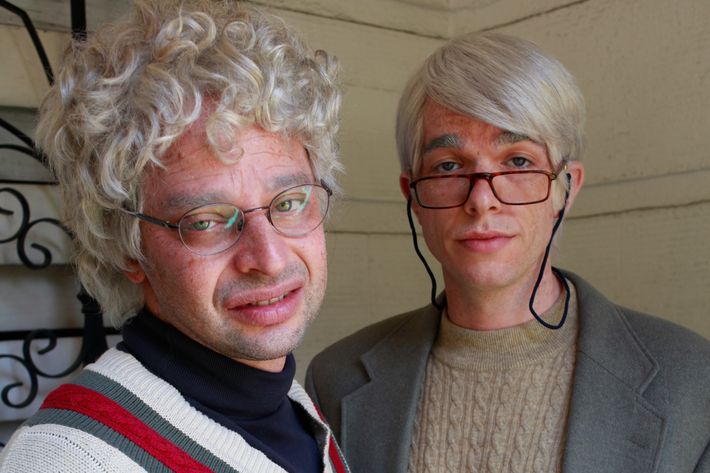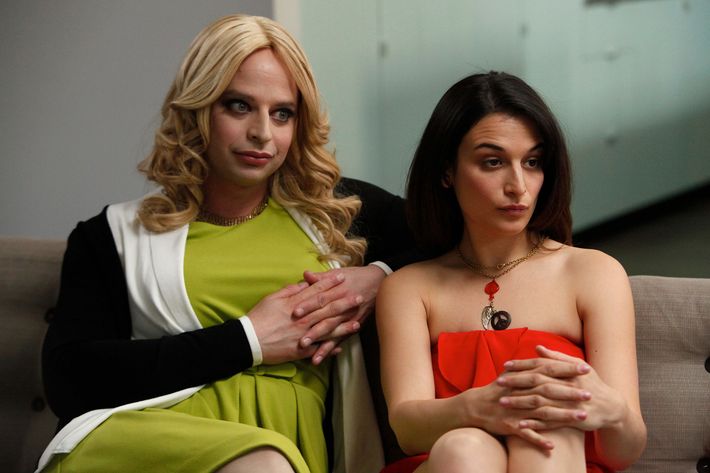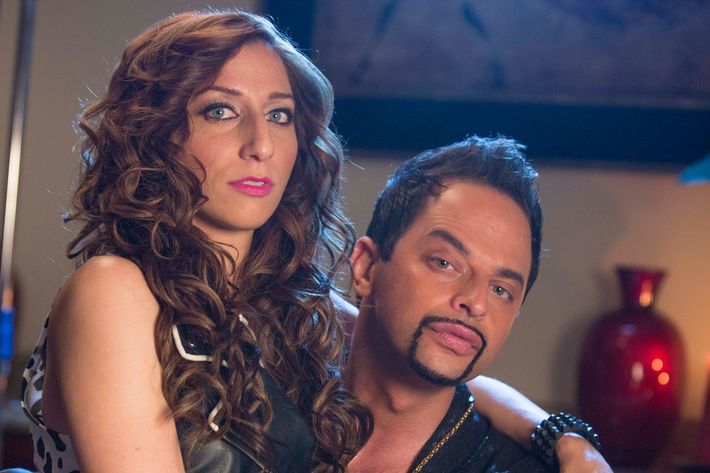
Let us all weep into our overstuffed tuna sandwiches and bags of Blisteritos, for Kroll Show has come to an end. We’ve known for a few months that this third season of the Comedy Central series helmed by Nick Kroll would be its last, and the final episode aired last night. Like all Kroll Show episodes, it was an extremely dense stew, filled with callbacks and blink-and-you’ll-miss-it running gags. The series always looked like it was a sketch show, but in reality, virtually every character was a recurring character, and there were multiple textual layers to any bit. In other words, it was tailor-made to be enjoyed by detail-oriented obsessives (including yours truly).
We caught up with Kroll a few days before the finale. He talked about what he wishes he could’ve done if it had kept going for a fourth season, mused on the show’s final scene, and unveiled plans for a possible new venture starring two of Kroll Show’s most-beloved characters.
How are you going to be sitting shiva after the final episode airs?
Sitting in my home, accepting visitors and baked goods and, obviously, tuna sandwiches.
Of course, right, the traditional dish for Kroll Show.
As one would expect, less from the Jewish faith and more from the “Oh, Hello” faith.
Although they were central characters in Kroll Show, doing a hidden-camera prank show called “Too Much Tuna,” you’ve been doing those characters for almost ten years now, haven’t you?
Yeah, yeah.
How have they evolved in your mind?
They have both evolved tremendously and not at all. Doing a thing based on tuna became a very helpful vehicle for them to expand beyond just being entirely New York–centric. Tuna fish is ubiquitous. So if you can picture a tuna sandwich, you have a sense-memory to attach to those two awful, awful men.

And it goes with a larger thing that I do genuinely believe about what we were doing on [Kroll Show], which is — like, there’s the “Oh, Hello” guys, who are specifically New Yorkers; Murph and Don from “Pawnsylvania” are specifically Philly and Pittsburgh; there’s all the Canadian characters that are, hopefully, specifically Canadian. But even if you’re not from any of those places, there’s something universal in the specificity.
Right, and even if you don’t watch reality TV, all of your sketches that parodied them had such an insane attention to detail about how those shows work. For example, the little music cues that play for a second or two when things happen on a reality show, or to introduce a character when he or she appears. Did you have a favorite one of those musical cues over the course of Kroll Show’s three seasons?
I really like [the cue where a singer sings], “You did it,” which we’ve used a lot. “You’ll always be my best friend,” which I think started in “PubLIZity” but then crossed over to Armond world at some point. Oh, and it was only used once, but I love one with Dr. Armond when you have the the big reveal [that he’s been framed and his wife was never murdered], that “Congratulations” song, like [sings], “Cooongraaatulaations” — that’s recently been stuck in my head. It’s really for me a battle between “You did it” and “You’ll always be my best friend.”
One last thing on George and Gil: Will they continue to live on in some form?
John and I are talking about plans. We have some grand designs for what to do with them in the future.
I presume you can’t tell me anymore than that?
I cannot. I’ll leave it at that.
You know, you mentioned “PubLIZity” a moment ago, and you guys decided to end the series with a scene from that running bit. Was there any debate about which of your long-running characters you should end the show with?
Well, it was not our intention while we were making what turned out to be the final season that it was going to be the final season. So it wasn’t purposeful, like us saying we should end this series with “PubLIZity.” But ironically, we started the series with “PubLIZity” — it was the skeleton for what became the pilot of the show, so it did feel like a nice bookend,that it would end with “PubLIZity” and it would end with them walking out the door.

Why didn’t you have Bobby Bottleservice and Farley in the series finale? They were the only things I was missing.
The truth is, again, we just didn’t know that we were tying up everything. But the idea that Bobby Bottleservice and Peter Paparazzo went into [Bobby’s] body to bounce the ghost of Farley’s love from his heart, felt like that was a …
Well, it’s a topper. Where else can you go? It’s so insane.
Exactly. And it was another example to us of saying, Jesus, how many more Bobby stories can we do in good faith?
One long-running character who did show up in the finale was fugitive plastic surgeon Dr. Armond, who had died in the previous episode and appeared as a ghost or angel or whatever. Why did he look so haggard? Wouldn’t he be all fresh and happy now that he was in heaven?
Well, there are the creative reasons, and then there’s the reality of it. One, dying is exhausting. And two, we shot that on the final day of production. We were rushing and I was on day 50 of 50 of shooting. I had shot Kroll Show going directly into The League, going directly to tour, and then, in this past year, going and making Adult Beginners, the movie that I have coming out in April, directly into writing Kroll Show, shooting it, and then literally the next day starting The League. So partly you could say it was creative choice, and partly it was me literally doing a disservice to my own physical capabilities.
What’s your favorite Jon Daly character from the show?
I love Gene Creemers. Besides the guys from Kids in the Hall, who else have you seen play such an interesting, muted, Canadian, gay, middle-aged man so convincingly? And Wendy Shawn, to be totally honest, is my favorite of the two Rich Dicks. Jon’s portrayal of Wendy is so beautifully empty. Leisure killed all sex in him, and he’s feminine but in a non-gay way, and he’s such a dead-eyed drug monster.
What were some things that you would have done in season four, had it happened? I feel like your Pitbull parody, the foot-fetishist Señor Feeture, was definitely going somewhere.
Yeah, Señor Feeture feels like something that people responded to and would have been fun to play more of. We could find out if he could ever break out of that green-screen prison and his own desires. Maybe hear more songs about fucking feet. “Dead Girl Town,” too. Or at least we could’ve seen [“Dead Girl Town” star] Logan, that character, what show he moves on to. Is there anything that made you be like, Aw, I just feel like I was getting to know this?

Oh, definitely: Farley’s makeover show, “Look Like Dis.” That was a master class from Chelsea Peretti. I really wanted to see her do more of that, having this character who is just an unbridled ego telling people how to live their lives.
If you talk to Chelsea about it, she said to me at one point that, like, Farley changed how Chelsea the person behaves.
Oh no, that sounds terrible.
No, I mean in a bad way! I don’t want to paraphrase or quote her, but playing characters can be a real release for people in a lot of ways.
Along those lines, you have a long-standing character from your live act who didn’t show up much in Kroll Show, which really surprised me: the frighteningly confrontational caterer to the stars, Fabrice Fabrice. Why was he such a small part of the show?
You know, certain characters that were created before Kroll Show served different purposes for me or for what I was doing. I still really love doing him, but a few things changed. Characters that existed before Kroll Show didn’t always serve [what] Kroll Show was, with its ongoing narrative structures. What we tried originally with Fabrice in the show was to do sort of man-on-the-street stuff. The idea idea was like, ooh, Fabrice is most fun when he’s interacting with real people. But that just became really hard and stressful and not fun to do, versus having controlled environments and being able to shape stories. I didn’t entirely serve Fabrice as well as I would’ve liked.
I also think that Fabrice used to be really mean about celebrities, and the further I’ve moved along and met a lot of people, celebrities become human beings, they’re no longer this abstract idea. It became less fun to make fun of actual people. Like, he used to talk about Raven-Symoné, and I was like, Why am I making fun of this poor girl? On a larger level, that’s not what’s funny. It’s funny that he has no filter and he’ll say anything to anyone, but it doesn’t necessarily have to be at the expense of anyone who he’s not talking to. But I also feel weirdly guilty, like I didn’t give him enough airtime. But the beauty is, I’m still in touch with Fabrice. He just discovered Bitmoji, and so he texts me Bitmojis, and he’s got a new phone that is a burner phone, so I’m always getting a new number that I assume is him. But we’re still in regular contact, so my hope is that he’ll continue to work with me.

